Enab Baladi – Khaled al-Jeratli
The end of 2023 witnessed a Turkish military escalation in northeast Syria, where the Autonomous Administration of North and East Syria (AANES), the political umbrella for the Syrian Democratic Forces (SDF) is in control, targeting the vital and economic infrastructure of the region, as Turkey considers it an extension of the Kurdistan Workers’ Party (PKK) funding sources, listed on Turkish ‘terror’ lists, which is the same scenario with which AANES concluded the year 2022.
While AANES and its military wing the SDF try to deny their affiliation with the PKK, Turkey sees the oil wells, which constitute the cornerstone of the Autonomous Administration’s economy east of the Euphrates River, as exploited by the PKK to finance its cross-border operations.
At the same time, AANES’ economy raises questions about the size and value of local oil production, the remaining resources, and the uses of this production in service projects and infrastructure works in northeast Syria.
In this in-depth report, Enab Baladi discusses with a group of experts and researchers, the Autonomous Administration’s mechanism for managing its economy, the exploitation of this economy by the Kurdistan Workers’ Party, and its transformation into an argument used by Turkey to target the region’s facilities under the eyes of the International Coalition led by the United States (the main supporter of the SDF in Syria).
What does Turkey target?
The latest statements concerning the damage sustained by oil facilities in northeast Syria came from the co-chair of the General Administration of Oil and Fuels in the Autonomous Administration, Abeer Khalid, on January 16, who stated that Turkish bombardment resulted in oil facilities going out of service, including the al-Owda and Karbi stations, and the al-Tafleh refinery, in addition to the al-Suwaydiya gas plant.
The inoperability of these facilities reduced fuel supplies to sectors such as energy, water, agriculture, and heating.
On December 28, 2023, a few days after the beginning of the Turkish escalation against it, AANES issued a statement specifying the areas targeted by Turkey during the escalation.
It said that the bombardment encompassed the entire Autonomous Administration-controlled areas, from al-Malikiyah and Qamishli in the east of al-Hasakah to Ain al-Arab/Kobani and villages in the countryside of Manbij, east of Aleppo governorate.
The Turkish military campaign targeted cities, villages, and towns located near its southern borders inside Syrian territory, from the Iraqi borders in the east to the vicinity of areas controlled by the Syrian National Army (SNA) supported by Turkey, east of Aleppo.
The Turkish Ministry of Defense stated that the Turkish Air Force carried out airstrikes against ‘terrorist targets’ in northern Syria and Iraq, destroying 29 targets including hideouts and shelters housing ‘terrorist leaders’, and oil facilities and depots used by the ‘Kurdistan Workers’ Party’.
The SDF commander, Mazloum Abdi, said through the social media platform ‘X’, that targeting the infrastructure and livelihoods of the population for the third time within a year is a ‘policy of starvation and occupation that amounts to war crimes’.
Turkey considers the SDF as an extension of the PKK, which the SDF denies despite admitting to having fighters from the Kurdistan Workers’ Party under its banner and occupying leadership positions.
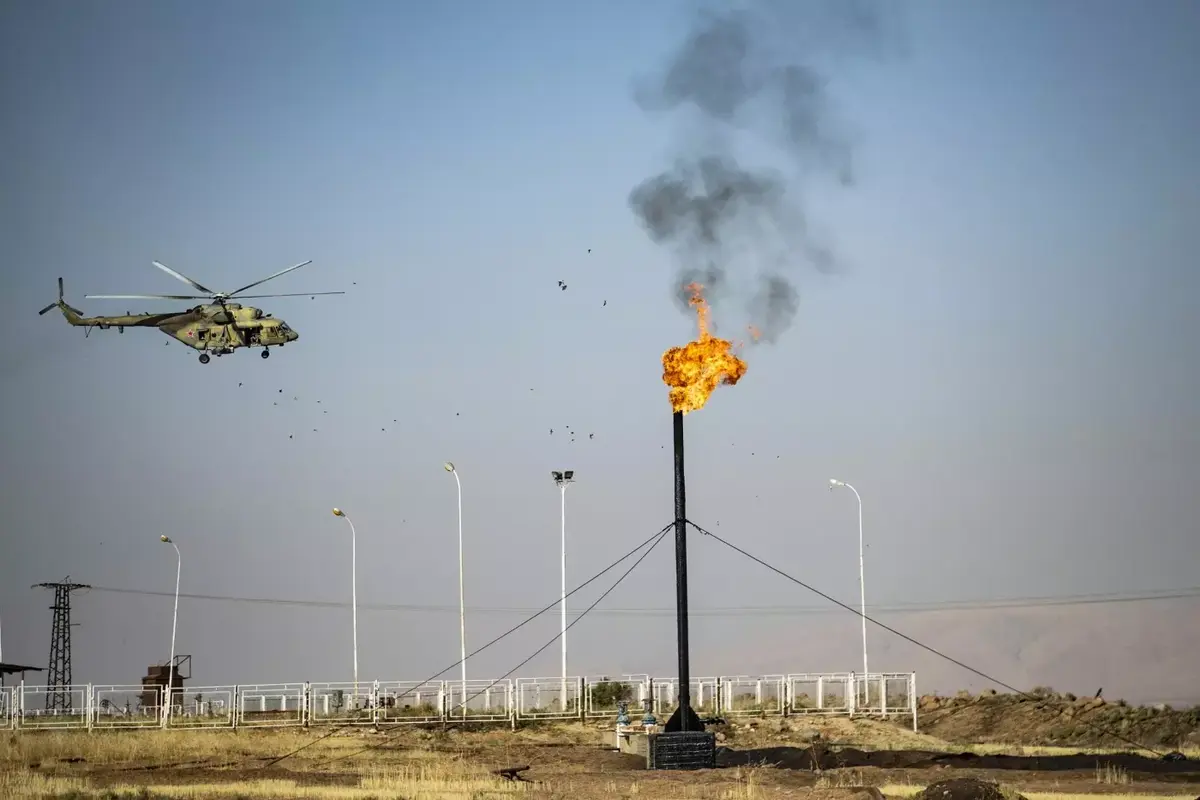
A Russian military helicopter flies over an oil field near the town of al-Qahtaniyah in the al-Hasakah province in northeast Syria – October 11, 2020 (AFP)
An economy unclear in features
From a Turkish perspective, oil revenues are considered an important source of income for the Autonomous Administration, which it views as a ‘quasi-state’ formed by the Kurdistan Workers’ Party (PKK) and the Kurdish People’s Protection Units (YPG) in Syria, according to a report published by Turkish foreign policy and security expert Omar Ozkizilcik in the Anadolu Agency.
The Democratic Union Party (PYD), which forms the foundation of the Autonomous Administration and is considered by Turkey as the Syrian branch of the Kurdistan Workers’ Party, published on its official website, on January 6, that the Executive Council in Raqqa affiliated with AANES held its annual meeting to approve the budget for 2024, but without mentioning numbers or budget details, and merely announced its approval.
AANES has not yet announced its budget for the current year and has not commented on what was published by the Democratic Union Party, and it had announced its budget for 2023 in the same manner, without providing numbers or details, while a search on the Autonomous Administration’s official website shows that the details of the 2022 budget are no longer available.
Tracking how AANES’ revenues are collected and spent is difficult, but the main resources come from oil sales, taxes and fees on income, and fees on imported goods and materials, according to a study conducted by economic researcher Sinan Hatahet, published within the Middle East Directions program in January 2020.
The study clarified that the Finance Authority is the central institution in the Autonomous Administration responsible for managing the region’s finances, noting that local councils also have the right to collect taxes and impose them, and collect revenues imposed on most professions and crafts, including small institutions such as street vendors, commercial shops, and public transportation.
AANES justifies these measures as aiming to fund public services, but there is a general belief that the quality of services provided does not match the amount of taxes collected.
In the same context, the co-chair of the Finance Authority in the Autonomous Administration, Ahmed Youssef, during a meeting with North Press Agency, said that the Administration relies on oil primarily in its revenues, a matter which is considered a ‘major flaw’ in the economy.
The Autonomous Administration is attempting to reduce the percentage of oil dependence in its total revenues, as it has been working to diversify sources since 2021 and increase secondary resources, which are revenues of cantons, companies, taxes, service fees, and others.
In 2021, the dependence on oil in the Administration’s budget was 92% of total revenues, while customs revenues accounted for 7%, and the rest of the revenues 1%, according to Youssef.
Oil management by the SDF
Hassan Kojar, The deputy co-presidency of the Executive Council of AANES, said in a previous conversation with the Saudi newspaper “Asharq Al-Awsat” that the Autonomous Administration produces about 150,000 barrels of oil daily, noting that the production was about 385,000 barrels per day before the year 2011. He pointed out that the Administration exploits less than half of the oil wells and fields in the areas under its control.
According to previous estimates provided by assistant researcher at the Omran Center for Strategic Studies, Manaf Quman, to Enab Baladi, based on information collected during the preparation for a study about the Autonomous Administration economy, the Administration produces 48,500 barrels a day from the oil wells in Deir Ezzor province alone, out of a total daily production of 80 to 120 thousand barrels.
The SDF distributes part of this production to local oil refineries for local consumption, which is the smaller part of the production. An additional part is exported to Iraqi Kurdistan for sale, and another part is sold in the areas controlled by the opposition in northwest Syria.
The researcher added that the largest part of the oil production is believed to be sold to the Syrian regime through two routes: the first passing through Raqqa towards regime-controlled areas and the second through river crossings that connect the two banks of the Euphrates River in eastern Deir Ezzor.
There are 13 active crossings on the banks of the Euphrates River, and the researcher said that these crossings have become a commercial artery for both banks over time, especially considering that the transportation of goods depends on smuggling, therefore, most of it is contraband.
The crossings also serve as a source for supplying both banks with consumer goods, according to the researcher, in addition to about 7,500 barrels of oil that crosses Deir Ezzor province daily towards the regime-controlled areas.
The researcher estimated the economic revenues for the SDF from exporting oil to the regime via the smuggling crossings alone in eastern Deir Ezzor at more than four million US dollars monthly.
Hassan Kojar added to Asharq Al-Awsat newspaper that the Autonomous Administration sells part of its oil production to traders affiliated with the regime at “symbolic” prices compared to their international counterparts, pointing to challenges in organizing sales operations due to the blockade imposed on the areas under its control.
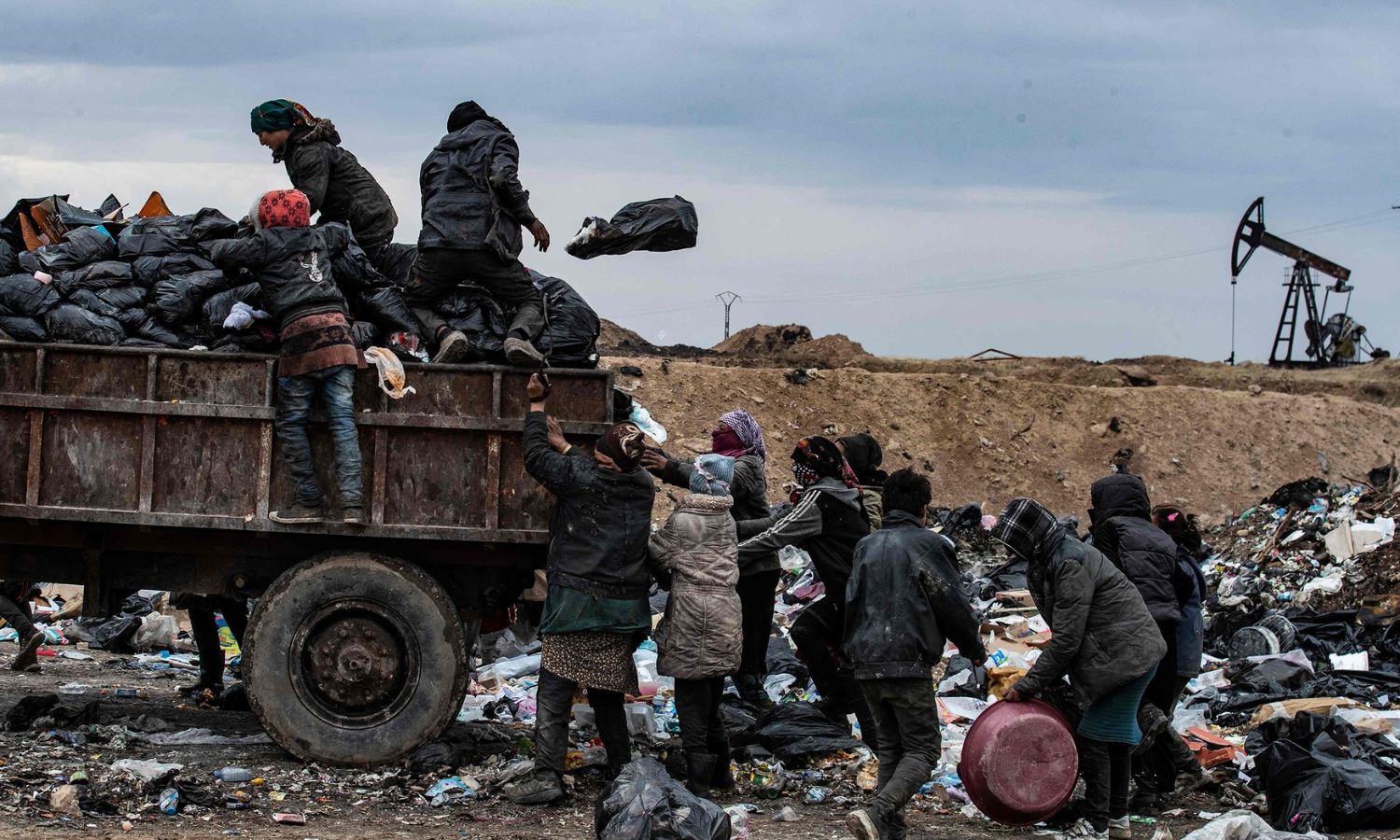
Syrians searching in a waste dump near an oil well near the town of al-Malikiyah, northeast Syria – January 20, 2021 (AFP)
PKK controls resources
The Autonomous Administration considers Turkey’s targeting of its vital facilities and oil wells as an assault on the service infrastructure related to the sustenance of residents, worsening the economic situation for inhabitants in the area, and ignores Turkish accusations about the involvement of the Kurdistan Workers’ Party in exploiting these facilities for self-financing, as Turkey sees it.
The Turkish expert in foreign policy and security, Omer Ozkizilcik, told Enab Baladi that the Autonomous Administration budget estimates achieved oil revenues of $602 million, but the estimated income for the Kurdish People’s Protection Units from oil is roughly three times higher than these figures.
He added that oil revenues range between $1.324 billion and $1.762 billion US dollars, which means nearly one billion dollars of revenues are used outside of Syria to finance “terrorist activities” of the “Kurdistan Workers’ Party.”
The expert believes that the $602 million referred to in the Autonomous Administration budget is also part of the “economic network of the PKK.”
Ozkizilcik added that the Kurdistan Workers’ Party also obtains one and a half billion US dollars from drug trafficking revenues, while oil revenues are equivalent to this amount if not slightly more, which means that the “party” has obtained a “huge” economic source of income since taking control of oil-rich areas in Syria.
Enab Baladi has not been able to reach an official or independent source to verify the accuracy of the figures mentioned by Ozkizilcik regarding oil revenues and drug trafficking.
From a counter-terrorism point of view, financing is extremely important, as targeting the financial resources of the PKK and the People’s Protection Units in Syria by bombing oil fields is easier and more effective than trying to reduce the entry of drugs or protection money collected in Europe from Kurdish businessmen under the guise of donations.
Omer Ozkizilcik, Expert in security affairs and foreign policy
The writer on Kurdish affairs, Hoshank Osi, believes that the Kurdistan Workers’ Party manages the region by 95%, while 5% of the management of the area is left to the general leader of the SDF, Mazloum Abdi, and some close to him.
He added that the 5% does not involve the political, military, and security aspects, but the economic side, as Osi sees Mazloum Abdi as “merely a figurehead” in the area.
Osi believes that leaving Mazloum Abdi as a figurehead is related to maintaining the international perspective of AANES and the SDF, as he pointed out that the PKK is capable of overthrowing Abdi, but such a move would open the eyes of the West and the East to it as a “domineering force,” whereas his presence as a “figurehead” serves the interests of the PKK in the region.
From time to time, conflicting statements are issued by first-line officials in the Autonomous Administration, Syrian Democratic Council (MSD), or the SDF regarding the Administration’s relationship with the Kurdistan Workers’ Party and the latter’s control over public life and armed formations in northeastern Syria.
Researchers explain this discrepancy as a clear indication of the existence of two currents within the SDF, separated by the American ally expressing support for a specific direction.
The researcher specializing in economic affairs at the Jusoor for Studies center, Khaled Turkawi, told Enab Baladi that the Kurdistan Workers’ Party is the controller and manager of the economy in northeastern Syria, through what is known as “Kurdish cadres” delegated by the PKK to the region to manage crucial parts of it, especially the crossings with northern Iraq, and institutions related to oil resources.
PKK lacks expertise
The official spokesman for the Deir Ezzor Military Council affiliated with the SDF, Turki al-Dhary (Abu Layth Khsham), told Enab Baladi via electronic correspondence that the Turkish bombardment directed at the facilities of AANES under the pretext of being managed by the PKK is “unfounded excuses,” pointing out that these facilities economically benefit the SDF, or the institutions of the Autonomous Administration that work on providing a “decent living” for the residents of northeastern Syria.
Al-Dhary added that the facilities and institutions of the Autonomous Administration were built by Syrian hands, and those who benefit from them are Syrians living in the region, who have no connection with the attacks that Turkey is subjected to or the losses it incurs in Iraq.
He pointed out that the Autonomous Administration has provided “evidence” that the Kurdistan Workers’ Party has no relation to the management of the region, but the international community does not want to listen and ignores this evidence, noting that the SDF will not weaken as a result of Turkish attacks targeting the area.
A Kurdish official in the Deir Ezzor Civil Council affiliated with the Autonomous Administration (whose name was withheld due to Enab Baladi’s lack of a work permit in the areas controlled by the SDF) told Enab Baladi that the Autonomous Administration relies on its own local internal expertise to manage the area.
He added that the Kurdistan Workers’ Party does not have the expertise to manage a “civil democratic” state, denying that the PKK controls the economy of the region.
The Kurdistan Workers’ Party (PKK) was established in Turkey during the seventies of the last century as a leftist armed group and characterized itself as a separatist movement with an ideological mix of Kurdish nationalism and socialist revolutionism.
In the eighties of the last century, it entered into military confrontations with the Turkish army in order to obtain political and cultural rights and to achieve the destiny of the Kurds of Turkey.
In the nineties, Turkish authorities arrested the party’s founder, Abdullah Öcalan, who was residing in Syria, and it is believed that the Syrian regime handed him over in a political deal, and Turkey placed him in one of its prisons where he remains to this day, while sources differ on the reasons for his departure from Syria.
The Kurdistan Workers’ Party is linked to a group of Kurdish parties similar to it in terms of principles and nationalistic creed, such as the Democratic Union Party (PYD) in Syria, and the Kurdistan Free Life Party (PJAK) in Iran.
Green light from the US
From time to time, Turkey repeats its criticism of the United States’ alignment with the SDF in northeastern Syria. Ankara considers Washington, its ally in the NATO alliance, to be supporting a “terrorist” group and unjustifiably posing a threat to its national security.
The economic affairs researcher at the Omran Center for Strategic Studies, Mohammad al-Abdullah, told Enab Baladi that the US administration has given the green light to the Autonomous Administration to benefit from the resources of the region to perhaps support itself, through service issues, infrastructure, and so on, and it cannot be certain that all the resources of the region go to fund the Kurdistan Workers’ Party outside of Syrian geography.
Al-Abdullah suggested that the revenues from the major portion of oil from this area are under the control of the Kurdistan Workers’ Party, while a small part of it goes to developing the services of the region and its infrastructure.
He considered that the ongoing fuel crisis in the areas controlled by the Autonomous Administration for years and the widespread cash crisis are clear evidence of the lack of real support from the Administration to provide for the needs of the residents.
Implementing Öcalan’s ideas
Looking at the way in which AANES manages the affairs of Syrians in northeastern Syria, it is noticeable that it is derived from the ideas of the former PKK leader, Abdullah Öcalan, who has been in Turkish prisons for years.
Öcalan has issued a series of books that propose a “communal model” for the Kurdish people and directly drew his “Öcalanian” ideology from the American social theorist Murray Bookchin, who was an extreme leftist who wanted to eliminate capitalism through the concept of “libertarian municipalism,” according to a brief analysis published by the Washington Institute for Near East Policy.
Looking at Abdullah Öcalan’s ideas, he recommended “democratizing urban neighborhoods” by empowering citizens’ associations, and these associations could ally at different levels.
According to his theory, federal municipalities would balance the “nation-state,” and capitalism would naturally disappear, and the municipalities would confiscate the main economic resources and “subject” the economy to their oversight, thus being owned by the society, according to the analysis.
Bookchin’s model is close to Maoism, which is considered the main source of inspiration for Öcalan, and it is not surprising that the Kurdistan Workers’ Party leader became a “disciple” of Bookchin’s ideology in 2004 after reading many of his works, as Öcalan made the concept of “libertarian municipalism” the official political ideology for the Kurdistan Workers’ Party during his party conference in 2005, according to the analysis.
Fabrice Balanche, the author of the analysis, mentioned that, in 2013, the Democratic Union Party started to manage the lands that the regime had withdrawn from in Syria and fell completely under its control through the creation of “The Democratic Society Movement,” which is a coalition that includes civil associations and political parties such as the Democratic Union, the Syriac Union, the Kurdish Peace and Democracy Party, and the Kurdistan Liberal Union.
However, this coalition ignored members of the Kurdish Democratic Party of Syria and others from the Kurdish National Council in Syria, considering them since then political enemies of the Movement.
And in November 2013, the Democratic Society Movement announced the establishment of its independent administration, known as “Rojava,” which was divided into three regions: Jazira, Kobani, and Afrin, until the “Social Contract” came and turned the areas under the Autonomous Administration into one region, comprising seven cantons.
Anas Shawakh, a political researcher specialized in Kurdish affairs at the Jusoor for Studies center, believes that the resemblance between the economic structure and organization of the region and the ideas of Abdullah Öcalan is a literal application and not a coincidence.
He added that according to the recently issued “Social Contract” of the Autonomous Administration, the economy of the region is a “communal economy,” which is the economic pattern that Öcalan has been advocating and theorizing for years.
This resemblance should not only be viewed economically but also the ideas of Öcalan can be compared with the provisions of the recently issued “Social Contract” to see this application.
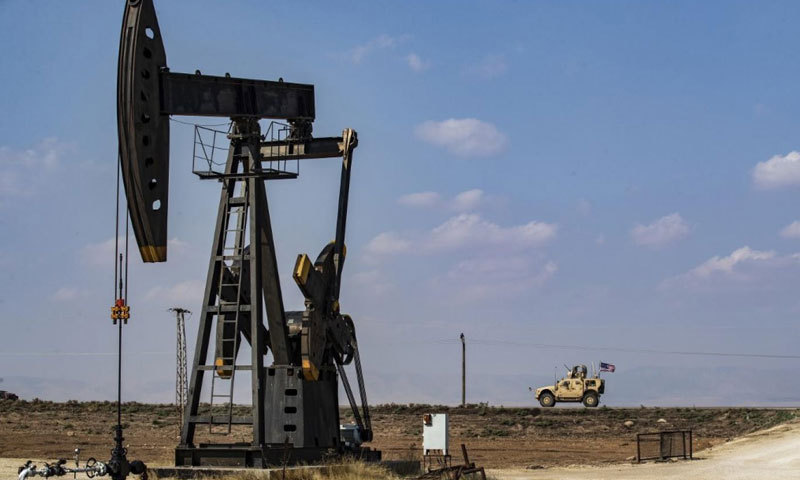
A US military vehicle passes through an oil pump jack in the countryside of Qamishli in northeastern Syria – October 26, 2019 (AFP)
The PKK’s expertise and resources
In a report issued by the European Police Office (Europol) in June 2023, it was stated that the Kurdistan Workers’ Party (PKK), trained in combat, may pose a “threat” to European Union countries.
Europol provided details about PKK activities in Europe, and its relationship with the People’s Protection Units (YPG) in Syria, pointing out that the PKK, which is listed on European “terrorism” lists, has generated “substantial amounts” of financial resources through annual fundraising events referred to as “campaigns.”
The report, translated by Enab Baladi, also mentioned that the party, which is spread across Syria, Turkey, Iraq, and Iran, is “very active” within the European Union and extensively uses EU countries for administrative, financial, and recruitment affairs.
The European Police Office pointed to the link between PKK and YPG in Syria, which falls within “extreme leftist terrorist organizations,” noting that the PKK activities in Europe focus on “recruitment, financial activities, and propaganda to support operations in Iraq, Syria, and Turkey.”
According to the report, the PKK has a sophisticated propaganda network in Europe and receives financial resources from various activities, which are used for humanitarian aid to areas inhabited by Kurds and for “funding the militias (People’s Protection Units) in Syria”. It was noted that “drug smuggling and fraud” are among the funding tools for PKK’s illegal financing, according to Europol.
External and internal funding
Dr. Firas Shaabo, an expert in Economics and Banking, told Enab Baladi that the Kurdistan Workers’ Party was aided by its longevity in obtaining stable sources of funding and acquiring experience in managing these resources over the past years.
The experience and complex financing network of the PKK helped it throughout its journey in operations circumventing and evading sanctions and bypassing monetary authorities around the world.
The expert divided the funding sources of the PKK into two parts: the first is internal, which can be seen as closely linked to the wealth managed by its Syrian branch “the Democratic Union Party” in northeastern Syria, from oil and food to inter-trade, and the second is external, manifested in branches of financing operations from abroad.
He indicated that the external financing operations are divided into several parts, including those related to drug trafficking, or donations from Kurdish diasporas abroad, in addition to the sale of Syrian oil abroad, which mostly comes back in the form of financing for the PKK.
The economic expert pointed out that “international laxity” in pursuing the funding sources of the PKK allows it to continue its economic activity and expand its financing sources towards Syria and Iraq.
The PKK operates on the traditional mechanism of “money laundering,” according to Shaabo, as it establishes companies and fictitious financial, industrial, and commercial institutions, and these companies and institutions oversee channeling the party’s financing through them, whether in the form of financial transfers or goods and commodities.
Kurdish affairs writer Hassan Zaza, who lives in northeastern Syria, told Enab Baladi that the Kurdistan Workers’ Party had stable sources of funding before northeastern Syria became an area of influence governed by the Autonomous Administration, ruling out the involvement of the PKK in managing the region’s economy.
He added that the PKK is not actually in need of the region’s economic resources and pointed out that all its resources are directed towards developing the economy and services of northeastern Syria.
The Kurdish writer considered that the economy of the PKK is mainly concentrated in Europe and dismissed the accusations directed at the Autonomous Administration of facilitating financing for the PKK as unfounded and part of repeated accusations promoted by Turkey and the Syrian regime against the region.
In 2019, the United States re-evaluated the status of the PKK, listed on its “terrorism” lists, and decided to continue the designation to confront the “terrorist threat” posed by the Kurdistan Workers’ Party in coordination with its NATO ally, Turkey.
According to what was published by the US Department of State on its official website at the time, Washington will maintain a “strong commitment” to its partnership with Ankara, including combating fundraising operations for the PKK in Europe and elsewhere.
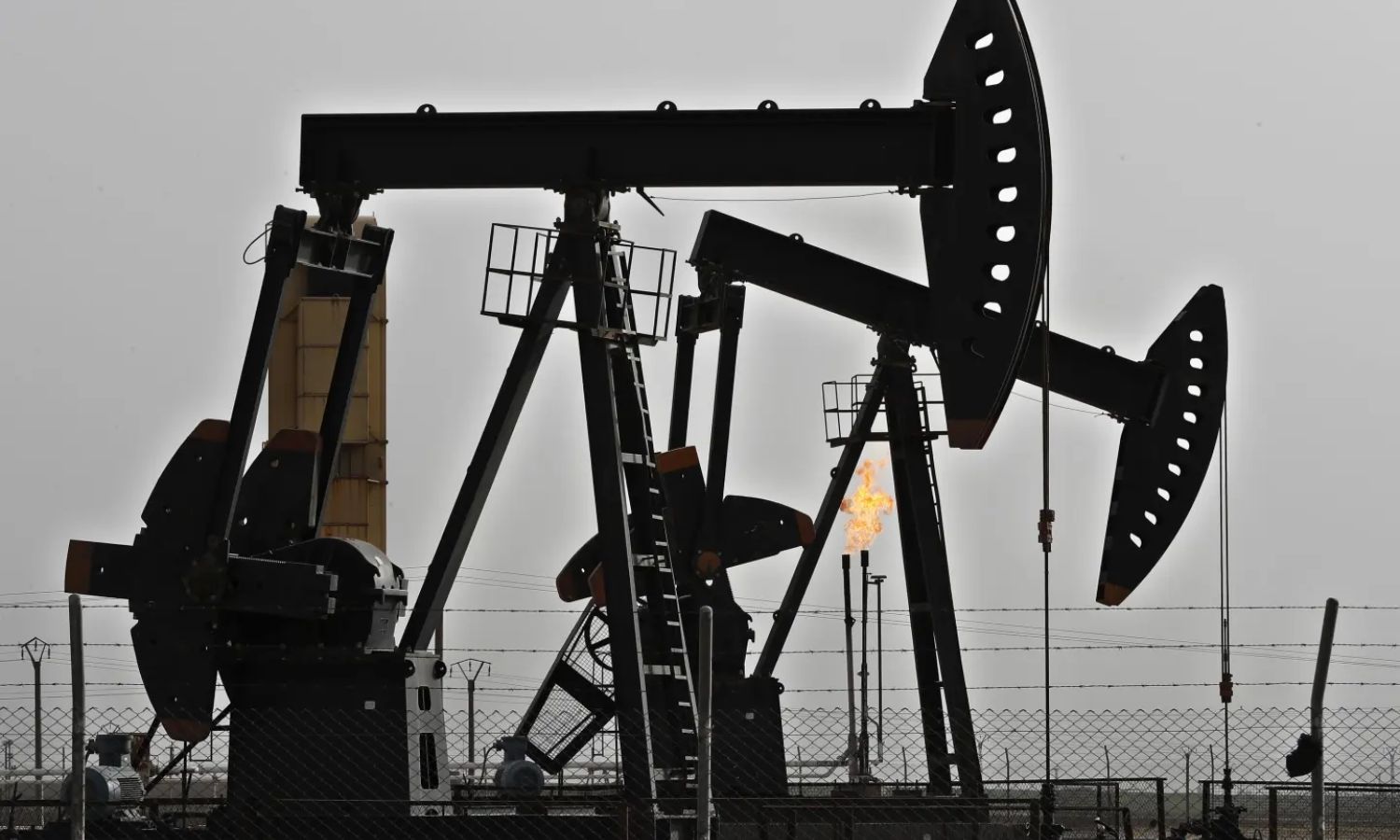
From an oil field controlled by the SDF in al-Hasakah governorate, northeastern Syria – March 27, 2018 (Hussein al-Mulla/AP)
Opportunities to remove the “terrorism” stigma
While northeastern Syria is run in the manner of “cantons” (regions) often spoken about by PKK leader Abdullah Öcalan, Turkey views the region as an extension of the activities of the Kurdistan Workers’ Party. Meanwhile, the Autonomous Administration insists on denying its affiliation with the Kurdish party, although Mazloum Abdi previously admitted the presence of PKK fighters in the SDF. Years later, he spoke to the American website “Al-Monitor,” considering Turkey’s accusations against the SDF as mere excuses to launch attacks in Syria.
Abdi added that the SDF does not pose any threat to Turkey, its borders, or its national security, noting that its forces are composed of Syrian Kurds who want a “peaceful relationship” with it.
While Abdi tried to portray the reality as different from the Turkish accusations regarding the PKK and the SDF, images of Abdullah Öcalan can still be seen on the streets of governorates with an Arab majority such as Raqqa and Deir Ezzor. Kurdish parties demand Turkey to release Öcalan through sit-ins and demonstrations in northeastern Syria.
Economically in the region, it is not clear that the SDF is trying to dissociate itself from the PKK to legitimize its economy, even if only partially in the region. Meanwhile, Osama Sheikh Ali, a research assistant at the Omran Center for Strategic Studies, believes that legitimizing the economy of the Autonomous Administration, especially regarding oil, is practically unattainable, especially with the recurring problems in ongoing export operations towards Iraqi Kurdistan.
Sheikh Ali cited the Iraqi Kurdistan model in the case of oil trade, noting that 20 years have passed since the fall of Baghdad under American occupation, and many years since the announcement of the establishment of the Kurdistan Region. However, the issues related to oil exports are still ongoing and required the mobilization of military forces several years ago when the “Kirkuk crisis” broke out between the two sides.
Regarding mechanisms to achieve this legitimacy for the oil of the Autonomous Administration, the researcher said that it requires reaching an agreement between the party and the center, between AANES and the Syrian regime, which does not appear to be imminent.
The researcher noted that the Kurdistan Workers’ Party does not rely on oil as the sole source of income, or that its economic income is tied to the economic resources of northeastern Syria, as the PKK has multiple and stable sources of funding, even before its actual presence in the Syrian geography.
Is Turkey overreacting?
Omer Ozkizilcik, a Turkish expert, believes that the Kurdistan Workers’ Party is a “transnational organization” operating in several countries, as it does not care about the legal borders of the state except for propaganda purposes and the legal framework for the alignment strategy in terms of partnership with the United States.
For Russia, the PKK is not a terrorist group, but for the United States, party fighters are considered terrorists if they are in Iraq, Iran, or Turkey, and once they cross the border into Syria, they become partners.
Omer Ozkizilcik, Expert in Security Affairs and Foreign Policies.
The expert added that just as al-Qaeda has a central core and branches that operate independently of the center within certain boundaries, the Kurdistan Workers’ Party enjoys privileges throughout the region to meet different needs and requirements, but it is centrally managed.
Therefore, the expert believes that the economic resources of the Kurdistan Workers’ Party are also centrally managed and used depending on the “terrorist group’s” needs.
Ibrahim Kaban, director of the Geo-strategic Network for Studies (based in Germany), and an expert in Kurdish affairs, told Enab Baladi that Turkey looks at any Kurdish movement as connected to the Kurdistan Workers’ Party, and any development of the “Kurdish issue” is a development for the Kurdistan Workers’ Party.
He added that Turkey’s view of the Kurdish movements in the region and their association with the Kurdistan Workers’ Party form the cornerstone on which Ankara’s foreign and security policies are built.
Kaban believes that the Autonomous Administration controls an area that constitutes roughly a third of Syria’s land and is inhabited by more than four and a half million people. Therefore, the question about the revenues from the region’s wealth is unjustified here, as the area needs large financial capabilities to manage it, in addition to the commercial blockade imposed on it, which forces the Autonomous Administration to pay extra money to secure some necessities for the areas it controls.
The link between AANES and the PKK
Khaled Turkawi, an economic researcher at the Jusoor for Studies Center, believes that the Autonomous Administration is not interested in getting rid of the PKK stigma that has been haunting it for years, which is the main reason for the recent disregard by the SDF of the Turkish accusations.
He added that any legalization that the Autonomous Administration might seek concerning its oil trade could be primarily linked to economic gains, as illegal trade forces it to sell at prices lower than those set for a barrel of oil in the region, and the stigma of the Kurdistan Workers’ Party has no relation to it.
Meanwhile, Dr. Firas Shaabo, a specialist in financial and banking sciences, believes that the continuation of the Autonomous Administration is linked to the presence of the Kurdistan Workers’ Party in Syria and Iraq.
Shaabo told Enab Baladi that the Administration has benefited and is still benefiting from the “party’s” expertise in establishing entities parallel to the state, as the PKK cadres are the main engine for running the wheel of northeastern Syria economically and administratively.
He added that the area controlled by the Autonomous Administration is the richest in Syria in terms of wealth diversity, such as agriculture and oil, thus it is not really concerned about whether Turkey views its economy as linked to the Kurdistan Workers’ Party.
Just as the Democratic Union Party or the Autonomous Administration have no problem applying the ideas of the Kurdistan Workers’ Party in Syria, they see no problem in forming an economic or security extension for the party in the region as well.
Meanwhile, Mohammad al-Abdullah, a researcher specializing in economic affairs at Omran Center for Strategic Studies, believes that the Autonomous Administration is dominated by the “hawks” wing (linked to the Kurdistan Workers’ Party), and this stream controls the sensitive joints within the Autonomous Administration, therefore it cannot be seen that there are ongoing or potential attempts to reform.
The two currents in the Autonomous Administration belong to the Kurdistan Workers’ Party, but their perspectives differ on some details, and they agree on the final form of the region’s shape and management, according to al-Abdullah.
The researcher said that the existing disagreement between the two currents is political, where the hardline current following the PKK opposes opening up to new countries and diversifying allies, while the second current represented by Mazloum Abdi (supported by the US) prefers diversifying allies, and opening up to other countries and forming new alliances, but the upper hand lies in the hands of the “hawks” hardliner stream, which is closely linked to the PKK.
if you think the article contain wrong information or you have additional details Send Correction
النسخة العربية من المقال
-
Follow us :
Most viewed
- Syrian Defense Ministry appoints "Abu Amsha" as Hama Brigade commander
- SDF faces two fronts... Damascus negotiates and Ankara wants war
- Former Syrian Interior Minister Mohammad al-Shaar surrenders to authorities
- Al-Sharaa meets Bin Salman: Together towards a true partnership
- Syrians hope for a new state without "wasta"












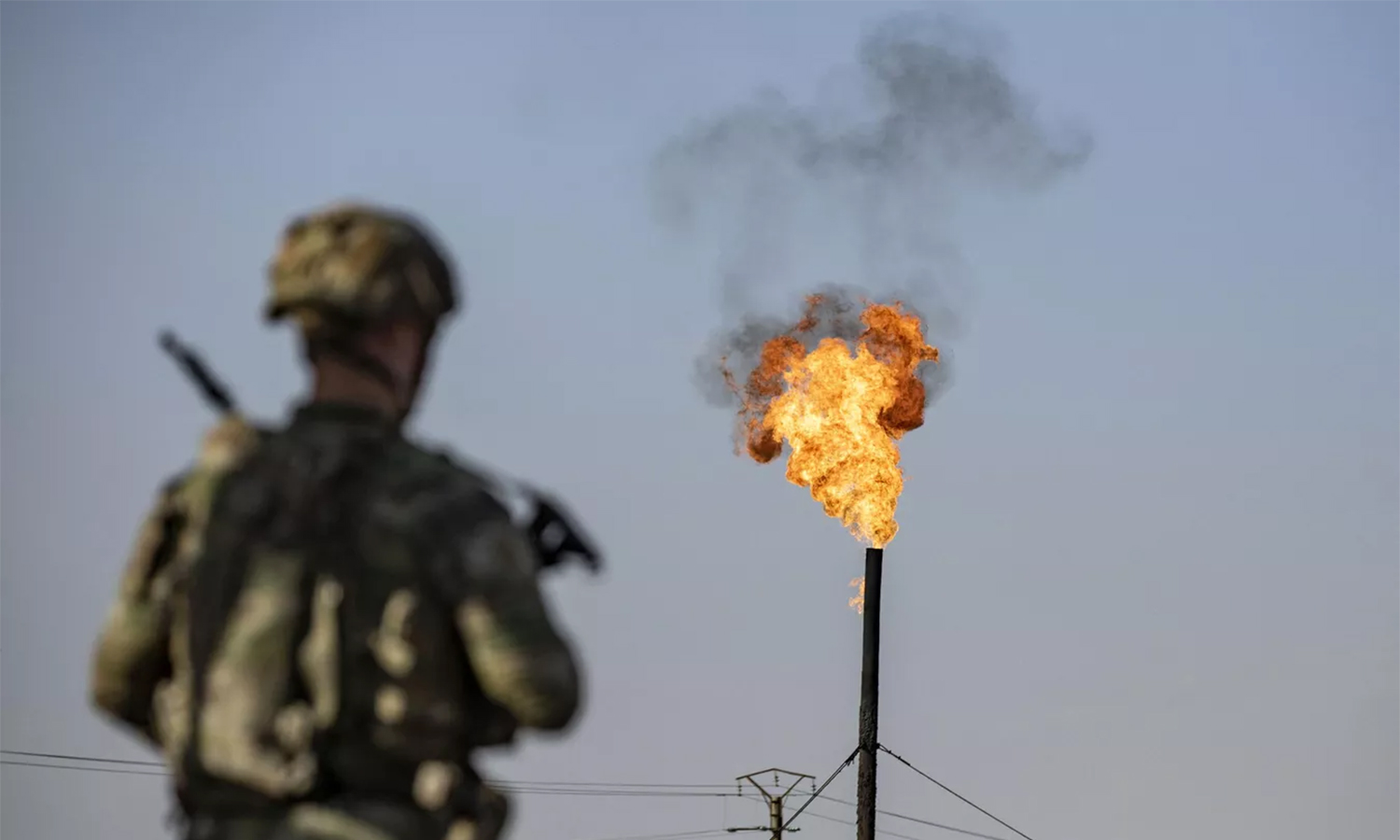
 A US soldier opposite an oil field in northeast Syria, 2023 (AFP/Delil Souleiman)
A US soldier opposite an oil field in northeast Syria, 2023 (AFP/Delil Souleiman)





 A
A
A
A
A
A
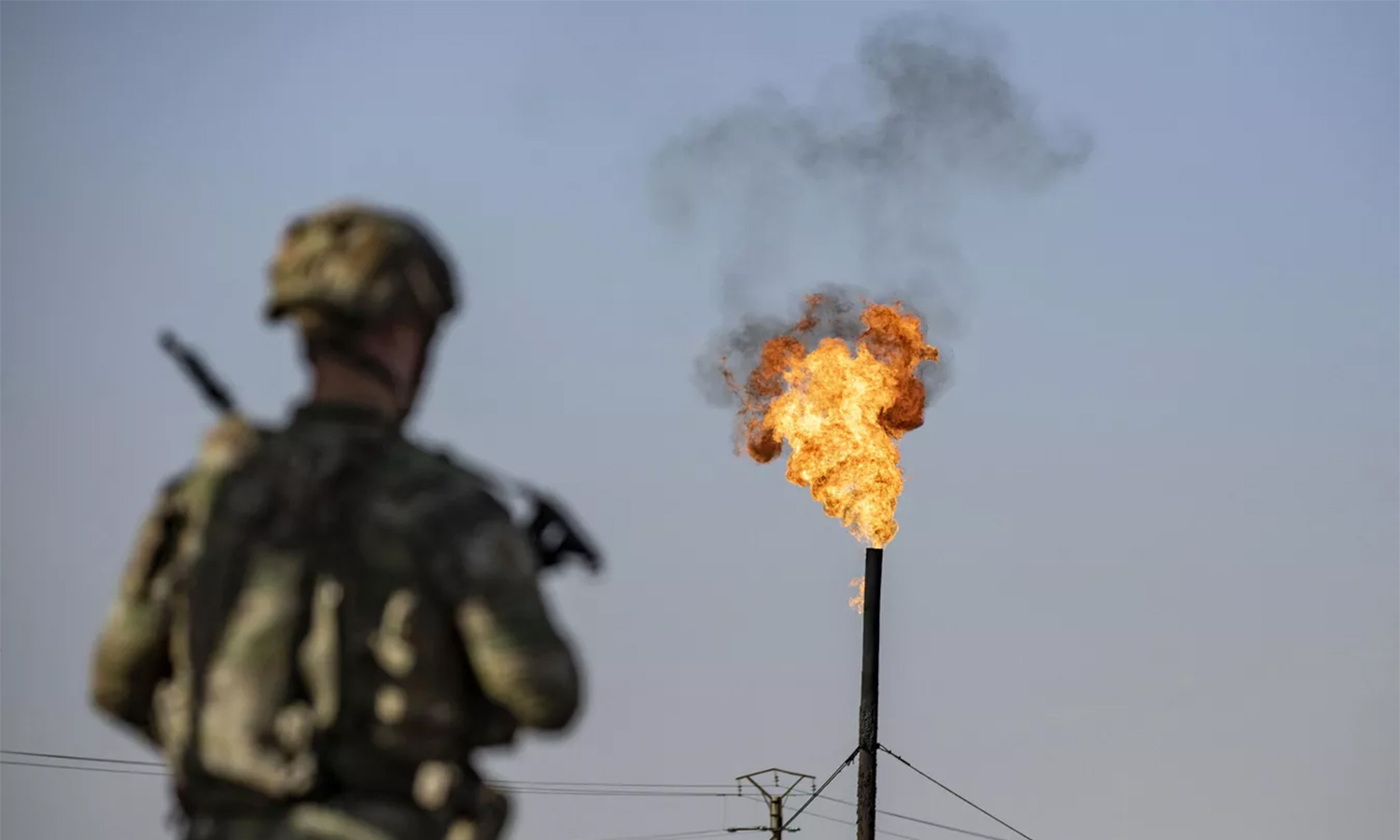
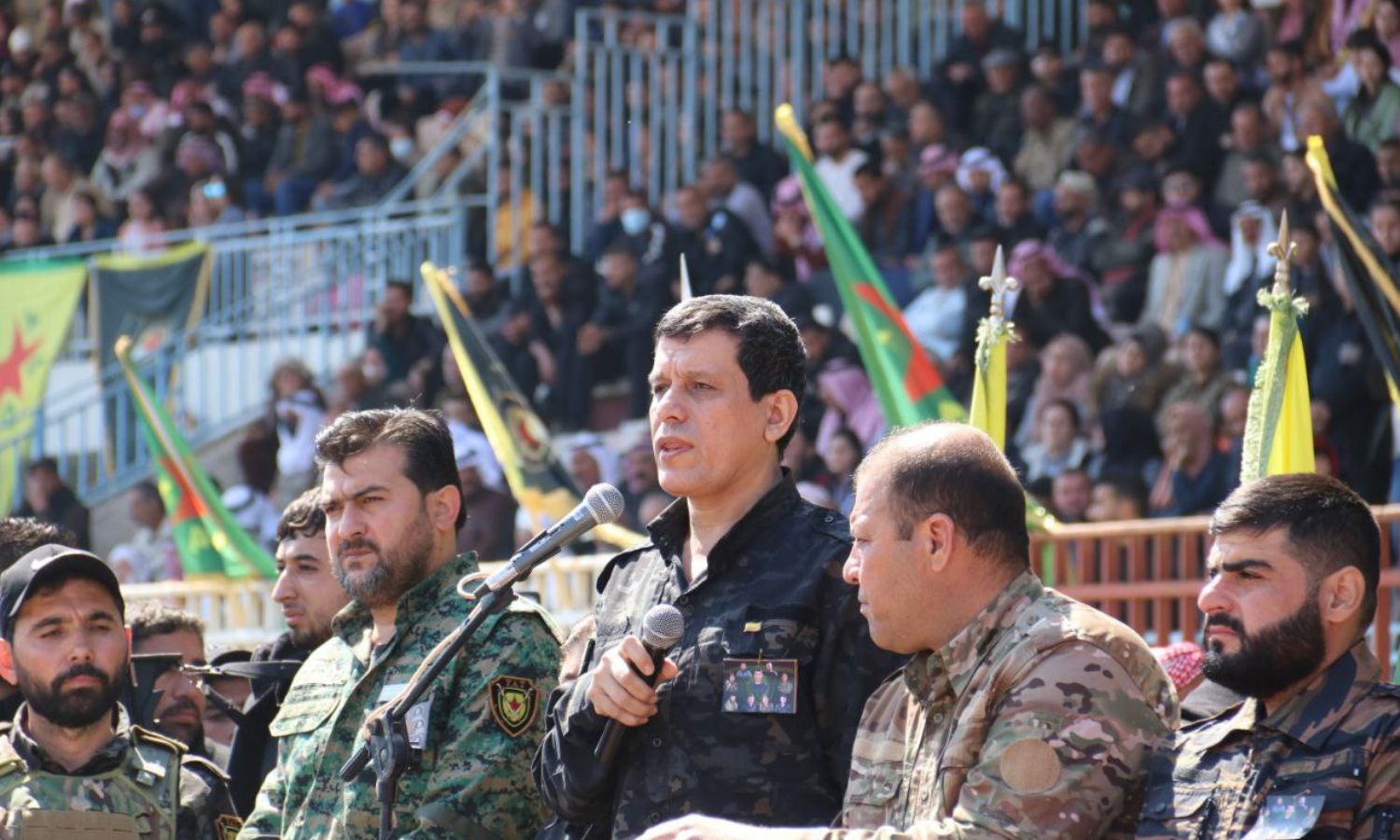


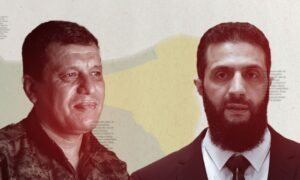
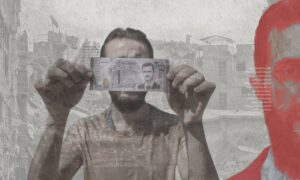
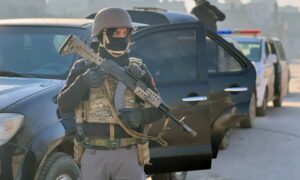


 More In-Depth
More In-Depth